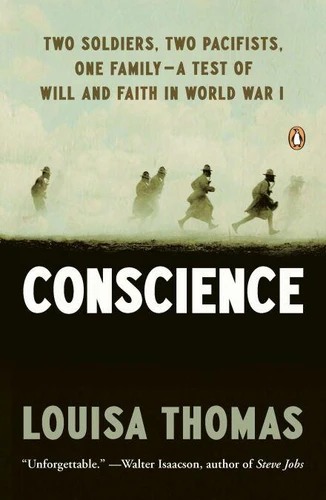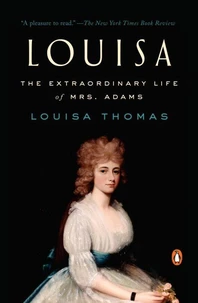Conscience. Two Soldiers, Two Pacifists, One Family - - a Test of Will andFaith in World War I
Par :Formats :
Disponible dans votre compte client Decitre ou Furet du Nord dès validation de votre commande. Le format ePub protégé est :
- Compatible avec une lecture sur My Vivlio (smartphone, tablette, ordinateur)
- Compatible avec une lecture sur liseuses Vivlio
- Pour les liseuses autres que Vivlio, vous devez utiliser le logiciel Adobe Digital Edition. Non compatible avec la lecture sur les liseuses Kindle, Remarkable et Sony
- Non compatible avec un achat hors France métropolitaine
 , qui est-ce ?
, qui est-ce ?Notre partenaire de plateforme de lecture numérique où vous retrouverez l'ensemble de vos ebooks gratuitement
Pour en savoir plus sur nos ebooks, consultez notre aide en ligne ici
- Nombre de pages336
- FormatePub
- ISBN978-1-101-51530-3
- EAN9781101515303
- Date de parution02/06/2011
- Protection num.Adobe DRM
- Taille2 Mo
- Infos supplémentairesepub
- ÉditeurPenguin Books
Résumé
Norman Thomas and his brothers' upbringing prepared them for a life of service-but their calls to conscience threatened to tear them apart Conscience is Louisa Thomas's beautifully written account of the remarkable Thomas brothers at the turn of the twentieth century. At a time of trial, each brother struggled to understand his obligation to his country, family, and faith. Centered around the story of the eldest, Norman Thomas (later the six-time Socialist candidate for president), the book explores the difficult decisions the four brothers faced with the advent of World War I.
Sons of a Presbyterian minister and grandsons of missionaries, they shared a rigorous moral upbringing, a Princeton education, and a faith in the era's spirit of hope. Two became soldiers. Ralph enlisted right away, heeding President Woodrow Wilson's call to fight for freedom. A captain in the Army Corps of Engineers, he was ultimately wounded in France. Arthur, the youngest, was less certain about the righteousness of the cause but sensitive to his obligation as a citizen-and like so many men eager to have a chance to prove himself.
The other two were pacifists. Evan became a conscientious objector, protesting conscription; when the truce was signed on November 11, 1918, he was in solitary confinement. Norman left his ministry in the tenements of East Harlem, New York, and began down the course he would follow for the rest of his life, fighting for civil liberties, social justice, and greater equality, and against violence as a method of change.
Conscience reveals the tension among responsibilities, beliefs, and desires, between ideas and actions-and, sometimes, between brothers. Conscience moves from the gothic buildings of Princeton to the tenements of New York City, from the West Wing of the White House to the battlefields of France, tracking how four young men navigated a period of great uncertainty and upheaval. A Thomas family member herself (Norman was Louisa's great grandfather), Thomas proposes that there is something we might recover from the brothers' debates about conscience: a way of talking about personal liberty and social obligation, about being true to oneself and to one another.
Sons of a Presbyterian minister and grandsons of missionaries, they shared a rigorous moral upbringing, a Princeton education, and a faith in the era's spirit of hope. Two became soldiers. Ralph enlisted right away, heeding President Woodrow Wilson's call to fight for freedom. A captain in the Army Corps of Engineers, he was ultimately wounded in France. Arthur, the youngest, was less certain about the righteousness of the cause but sensitive to his obligation as a citizen-and like so many men eager to have a chance to prove himself.
The other two were pacifists. Evan became a conscientious objector, protesting conscription; when the truce was signed on November 11, 1918, he was in solitary confinement. Norman left his ministry in the tenements of East Harlem, New York, and began down the course he would follow for the rest of his life, fighting for civil liberties, social justice, and greater equality, and against violence as a method of change.
Conscience reveals the tension among responsibilities, beliefs, and desires, between ideas and actions-and, sometimes, between brothers. Conscience moves from the gothic buildings of Princeton to the tenements of New York City, from the West Wing of the White House to the battlefields of France, tracking how four young men navigated a period of great uncertainty and upheaval. A Thomas family member herself (Norman was Louisa's great grandfather), Thomas proposes that there is something we might recover from the brothers' debates about conscience: a way of talking about personal liberty and social obligation, about being true to oneself and to one another.
Norman Thomas and his brothers' upbringing prepared them for a life of service-but their calls to conscience threatened to tear them apart Conscience is Louisa Thomas's beautifully written account of the remarkable Thomas brothers at the turn of the twentieth century. At a time of trial, each brother struggled to understand his obligation to his country, family, and faith. Centered around the story of the eldest, Norman Thomas (later the six-time Socialist candidate for president), the book explores the difficult decisions the four brothers faced with the advent of World War I.
Sons of a Presbyterian minister and grandsons of missionaries, they shared a rigorous moral upbringing, a Princeton education, and a faith in the era's spirit of hope. Two became soldiers. Ralph enlisted right away, heeding President Woodrow Wilson's call to fight for freedom. A captain in the Army Corps of Engineers, he was ultimately wounded in France. Arthur, the youngest, was less certain about the righteousness of the cause but sensitive to his obligation as a citizen-and like so many men eager to have a chance to prove himself.
The other two were pacifists. Evan became a conscientious objector, protesting conscription; when the truce was signed on November 11, 1918, he was in solitary confinement. Norman left his ministry in the tenements of East Harlem, New York, and began down the course he would follow for the rest of his life, fighting for civil liberties, social justice, and greater equality, and against violence as a method of change.
Conscience reveals the tension among responsibilities, beliefs, and desires, between ideas and actions-and, sometimes, between brothers. Conscience moves from the gothic buildings of Princeton to the tenements of New York City, from the West Wing of the White House to the battlefields of France, tracking how four young men navigated a period of great uncertainty and upheaval. A Thomas family member herself (Norman was Louisa's great grandfather), Thomas proposes that there is something we might recover from the brothers' debates about conscience: a way of talking about personal liberty and social obligation, about being true to oneself and to one another.
Sons of a Presbyterian minister and grandsons of missionaries, they shared a rigorous moral upbringing, a Princeton education, and a faith in the era's spirit of hope. Two became soldiers. Ralph enlisted right away, heeding President Woodrow Wilson's call to fight for freedom. A captain in the Army Corps of Engineers, he was ultimately wounded in France. Arthur, the youngest, was less certain about the righteousness of the cause but sensitive to his obligation as a citizen-and like so many men eager to have a chance to prove himself.
The other two were pacifists. Evan became a conscientious objector, protesting conscription; when the truce was signed on November 11, 1918, he was in solitary confinement. Norman left his ministry in the tenements of East Harlem, New York, and began down the course he would follow for the rest of his life, fighting for civil liberties, social justice, and greater equality, and against violence as a method of change.
Conscience reveals the tension among responsibilities, beliefs, and desires, between ideas and actions-and, sometimes, between brothers. Conscience moves from the gothic buildings of Princeton to the tenements of New York City, from the West Wing of the White House to the battlefields of France, tracking how four young men navigated a period of great uncertainty and upheaval. A Thomas family member herself (Norman was Louisa's great grandfather), Thomas proposes that there is something we might recover from the brothers' debates about conscience: a way of talking about personal liberty and social obligation, about being true to oneself and to one another.






